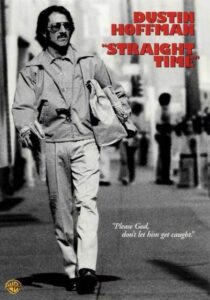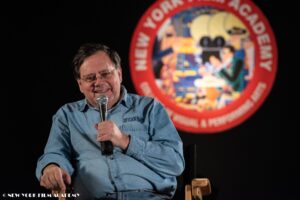On Thursday, December 5, New York Film Academy hosted a screening and discussion with noted film critic Peter Rainer on Straight Time, directed by Ulu Grosbard. Made in 1978, the American crime drama centers around a career criminal, Max Dembo (Dustin Hoffman), who is determined to go straight after his latest stint in prison. He takes a mindless job in a cannery, patiently endures the abuse of Earl, his pompous parole officer, and begins a romance with a sympathetic girl from the employment office. But when Earl erroneously busts Jack for drug abuse, the ex-con cracks, setting off a reckless crime spree.

Peter Rainer has 30 years of professional experience as a film critic and is currently the film critic for the Christian Science Monitor and can be heard regularly on NPR’s Film Week on KPCC-FM. He was one of three finalists in 1998 for the Pulitzer Prize in Criticism and is a three-time winner of the Arts and Entertainment Journalism Award for best online film critic. He has also written and co-produced two A&E biographies—on Sidney Poitier and John Huston—as well as co-authoring the film Joyride (1977). He has served on the main juries for the Venice and Montreal film festivals.
Rainer opened up the discussion by asking students in attendance what they thought about Straight Time in relation to Hoffman’s more popular work in more well-known hits such as The Graduate and Tootsie. One student expressed, “From what I know of Dustin Hoffman, I expected the film to be a redemption story for the protagonist trying to assimilate back into society after prison, but the film quickly took a left turn that I was not anticipating and it was a role I’ve never seen him play before.”

Rainer touched upon the fact that Straight Time was not a film that gained a lot of traction, and felt that was partly due to the fact that the role of Max Dembo was such a deviation from Hoffman’s usual beloved underdog characters. Instead, Rainer shared, the film got more attention for the events that occurred behind the scenes; citing the litigation battle between Hoffman and First Artists Production Company over the creative rights to the film after the shooting had gone 23 days over schedule and $1 million over budget.
Sharing his film critic expertise, Rainer advised, “A good way to look at a scene is to think about all the different ways it could have been shot, and then decipher why it is the director chose to portray it in that specific way,” specifically referring to scenes in Straight Time that contributed to the depiction of Hoffman’s character as a hardened criminal versus an individual in unfortunate circumstances.
Additionally, Rainer commended the film’s use of film noir techniques while also effectively humanizing the characters and removing the glitz of Los Angeles to portray a more realistic story. In turn, students in attendance were able to compare and contrast the film’s strategic use and deviation from classic film noir.

New York Film Academy thanks Peter Rainer for taking the time to share his knowledge and critical expertise with students.